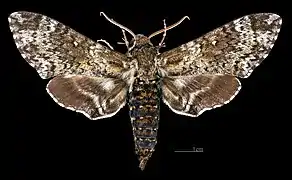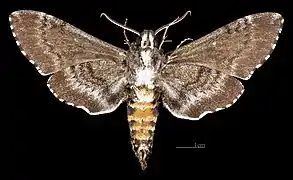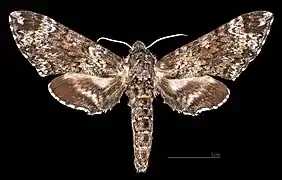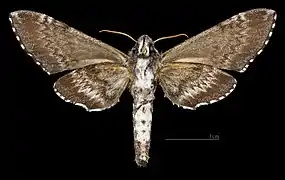Dolba
Dolba is a monotypic moth genus in the family Sphingidae erected by Francis Walker in 1856. Its only species, Dolba hyloeus, the pawpaw sphinx, was first described by Dru Drury in 1773.
| Pawpaw sphinx | |
|---|---|
.jpg.webp) | |
| Scientific classification | |
| Domain: | Eukaryota |
| Kingdom: | Animalia |
| Phylum: | Arthropoda |
| Class: | Insecta |
| Order: | Lepidoptera |
| Family: | Sphingidae |
| Tribe: | Sphingini |
| Genus: | Dolba Walker, 1856 |
| Species: | D. hyloeus |
| Binomial name | |
| Dolba hyloeus | |
| Synonyms | |
| |
Distribution
The pawpaw sphinx ranges throughout the eastern United States and southeastern Canada, south to Florida and west to Wisconsin, eastern Oklahoma, and southern Texas.[1]
Description
The wingspan is 50–68 millimetres (2.0–2.7 in).[2] While the pawpaw sphinx's cryptic coloration appears similar to that of certain Noctuid moths, such as the members of genus Catocala, the pawpaw sphinx's forewings do not overlap at rest, such that part of the abdomen remains exposed. The pawpaw sphinx can be distinguished from the rustic sphinx (Manduca rustica) by the former's smaller size and the absence of orange dots on the abdomen that the rustic sphinx exposes in flight.[3]
 ♂
♂ ♂ △
♂ △ ♀
♀ ♀ △
♀ △
Biology
Larvae of this species feed on pawpaw, as well as blueberries[3] and deciduous hollies such as inkberry and winterberry.[2]
References
- Kitching, I.J. (2022). "Dolba hyloeus (Drury, 1773)". Sphingidae Taxonomic Inventory. Retrieved 17 September 2022.
- Oehlke, Bill. "Dolba hyloeus". World's Largest Saturniidae Site!. Silkmoths.bizland.com. Archived from the original on 2015-04-28. Retrieved 21 September 2022.
- Cotinis (20 September 2021). "Species Dolba hyloeus - Pawpaw Sphinx - Hodges#7784". BugGuide. Retrieved 21 September 2022.
External links
- Lotts, Kelly & Naberhaus, Thomas (2017). "Pawpaw sphinx Dolba hyloeus (Drury, 1773)". Butterflies and Moths of North America. Retrieved January 1, 2019.